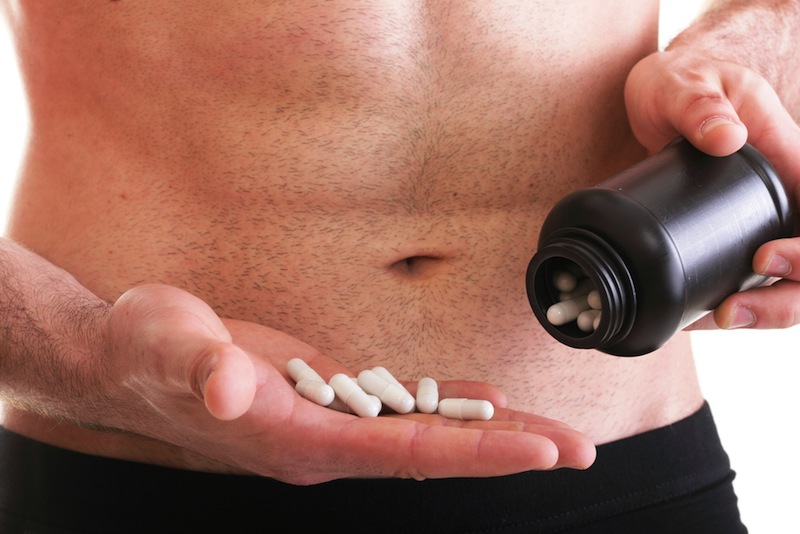What Is Creatine?

Creatine is a chemical that powers your muscles when they need a strong burst of energy, but have already burned through stores of ATP, the primary source of energy in the body. It was discovered in 1832 in beef, and has been continually studied. Since the 1990s, creatine has become one of the most popular performance enhancers used by athletes.
Unlike many performance-enhancing substances, creatine use is allowed under the rules of the International Olympic Committee as well as the National Collegiate Athletic Association, or NCAA. Gold medalist sprinter Linford Christie and National Football League legends Troy Aikman and John Elway reportedly used creatine. Each year, Americans use more than 4 million kilograms (8. 8 million pounds) of creatine, according to the National Institutes of Health (NIH).
The body makes about half the creatine it needs. The other half comes from foods, especially meats and fish, which means vegetarians often have lower levels of creatine than people who eat meat.
Most creatine in the body is stored in the skeletal muscles, which are the muscles you control to move your body. The rest is stored in the heart, brain and other tissues.
Creatine is especially important when you're making quick, powerful movements, such as the ones required for high jumping and weight lifting. For this reason, creatine supplements are most popular among male athletes in sports that require quick bursts of energy. Sprinting, football, wrestling and weight lifting are examples of activities that would supposedly benefit from creatine.
What is creatine used for?
A 2001 study published in the journal Pediatrics found children as young as age 10 were using creatine. Of the more than 1,000 student athletes surveyed in Westchester County, N.Y., about 5 percent reported using creatine. However, 44 percent of high-school senior athletes admitted taking creatine for both athletic performance and appearance.
Get the world’s most fascinating discoveries delivered straight to your inbox.
Creatine supplements are widely available in nutritional supplement specialty stores and supermarkets, and from online vendors. Creatine may be sold in tablets and capsules, or in energy drinks, powders or liquids. Creatine is now often included in sports drinks because some studies show it is better absorbed when combined with carbohydrates.
Beyond athletic performance, clinicians have begun experimenting with creatine to treat various disorders. Creatine has been used to treat a condition called gyrate atrophy, which affects the eye. It's been used to help people with Parkinson's disease, Huntington's disease and some types of muscular dystrophy. Creatine is also being tested in the treatment of ALS (amyotrophic lateral sclerosis), also known as Lou Gehrig’s disease, and the genetic disorder McArdle's syndrome.
Creatine supplements are sometimes touted as a treatment for bipolar disorder and depression. Some claim creatine can help rheumatoid arthritis and COPD (chronic obstructive pulmonary disease).
Creatine may also play a role in heart health. Creatine supplements have been studied as a way to improve heart muscle strength, body weight and endurance in patients who survive heart failure. Creatine may help curb high cholesterol, lower triglycerides (fats circulating in the bloodstream) and lower homocysteine levels, which are associated with heart problems and stroke.
Do creatine supplements work?
Creatine does show promise in athletic training, particularly for high-intensity movements such as sprinting, studies show. For example, a 2013 study of 16 amateur swimmers found that those who took creatine supplements had a lower heart rate and blood lactate levels (a measure of tired muscles) after swimming sprints compared with athletes who took a placebo. These results were measured after the participants took the supplements for six days, according to the paper published in the Journal of Sports Medicine and Physical Fitness. Some small studies have shown creatine increases lean muscle mass, strength and speed.
However, studies have suggested a limit to creatine benefits in highly trained athletes. From existing studies, it appears that so-called supplement "loading" produces the best results. For example, taking initial doses (sometimes called "loading doses") of 20 grams a day for five days, then halting creatine supplements appears to be more effective than a daily dose of creatine for long periods of time.
However, many scientists believe more study of creatine needs to be done. Most studies of creatine have included only 40 people at the most, and these participants weren't representative of all athletic abilities or ages, according to the U.S. Department of Health and Human Services National Institutes of Health. Creatine has not been effective at improving endurance and aerobic performance in most studies.
Preliminary studies show creatine may soothe muscle pain of people with McArdle's disease. McArdle's disease is a genetic syndrome that stops a person's ability to break down the energy source glycogen. People with McArdle's disease typically have poor stamina and muscle pain.In a 2000 study of nine people with McArdle's disease, five people reported that creatine improved muscle pain and helped them tolerate exercise better, according to the paper published in the Archives of Neurology.
People in that study took very high doses of creatine, about 150 milligrams for every kilogram of their body weight, for five days. Then the participants continued by taking 60 milligrams of creatine per kilogram of body weight for the rest of the five-week study. Later experiments found that at higher doses, creatine can make symptoms of McArdle's disease worse.
Study results have been less promising for creatine and rheumatoid arthritis. Although creatine does increase muscle strength in people with rheumatoid arthritis, the supplements do not seem to change how well patients function, according to the NIH.
Creatine may slightly increase strength in people who have muscular dystrophy or other muscle diseases. Preliminary evidence shows creatine may slightly improve muscle strength in people with the rare muscle and skin disorders polymyositis and dermatomyositis. However, there is not enough evidence to say for certain whether or not creatine is effective at treating these disorders, according to the NIH.
People in the early stages of Parkinson's disease may see a benefit from taking creatine. In a study of 20 Parkinson's patients, people who were taking creatine supplements made better gains over 24 sessions of an upper-body strength conditioning program compared with people who took a placebo, according to the 2007 paper published in the journal Neurorehabilitation and Neural Repair. Other preliminary studies showed creatine supplements slightly improved mood in Parkinson's patients, and may slow progression of the disease in early stages.
Preliminary evidence shows creatine may lower triglycerides and homocysteine levels, according to Penn State Milton S. Hershey Medical Center. Homocysteine is an amino acid in the blood, and higher homocysteine concentrations are linked to a higher risk of heart disease and stroke, according to American Heart Association. More studies are needed to determine whether creatine supplements may reduce high cholesterol, according to the NIH.
So far, studies show creatine supplements may help increase strength and endurance in people who have had heart failure. From trials done in heart failure survivors, it appears the best creatine supplement dosage is 20 grams per day for five to 10 days. Studies also show creatine may slow vision loss from the eye disease called gyrate atrophy. According to the NIH, the best creatine supplement dosage found for gyrate atrophy is 1.5 grams per day.
There are not enough studies to determine if creatine supplements can help bipolar disorder or depression, according to the NIH. Oral creatine supplements do not seem to slow the progression of ALS or improve the chances of surviving the disease, according to a 2012 review by the Cochrane Collaboration.
Are creatine supplements safe?
Creatine supplements are likely safe for adults when taken at recommended doses. A review of scientific studies on creatine by the Institute of Medicine (IOM) Committee on Dietary Supplement Use by Military Personnel found that getting five grams of creatine a day (from food or supplements) is probably safe over the long term. However, creatine in very high doses is possibly unsafe and may harm kidney, liver or heart function, according to the NIH.
A few cases of athletes who had dangerous reactions after taking creatine have raised concerns that creatine may have serious side effects at recommended doses. For example, combining creatine with caffeine and the herb ephedra (also called ma huang) might increase the chance of having a stroke, as happened in one athlete, according to the IOM committee report for the military. Creatine supplements may be linked to a skin condition called pigmented purpuric dermatosis. The IOM committee also noted three cases of people taking creatine supplements who suffered kidney failure. Overall, the IOM committee considered kidney problems to be an unusual reaction to creatine supplements, but didn't entirely dismiss the risk to kidneys.
Cramping, stomach pain, nausea and diarrhea are the most commonly reported side effects from taking creatine supplements. Creatine may cause muscles to retain water, but professional sports nutrition and medical associations are split on whether there is enough scientific evidence to link creatine to excess water weight. There have also been reports of dehydration and muscle strains while taking creatine, according to a joint statement by the American Dietetic Association, Dietitians of Canada and the American College of Sports Medicine. The joint statement recommended that professionals carefully screen athletes for potential kidney or liver problems before starting a creatine regimen.
Few studies have looked at how creatine supplements might interact with prescription medication. However, the NIH recommends people be cautious when taking creatine supplements alongside nephrotoxic drugs, meaning medications that can cause kidney damage. Some common drugs known to be potentially nephrotoxic include nonsteroidal anti-inflammatory drugs (NSAIDs) such as ibuprofen, naproxen, piroxicam and indomethacin. Some antibiotics, called aminoglycosides, also carry a risk of kidney damage that could be amplified by creatine. Gentamicin, amikacin and tobramycin are examples of aminoglycoside antibiotics. The immunosuppressant cyclosporine can also have this effect. The NIH warns that combining creatine supplements with nephrotoxic drugs may increase a person's risk of kidney damage.
Nutritional supplements are held to lower regulatory standards than medications under the Food and Drug Administration. This means there is a greater chance that supplements with creatine are impure or do not have the reported doses on the bottles, according to the American Academy of Orthopaedic Surgeons.

 Live Science Plus
Live Science Plus





